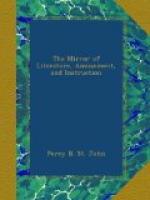Among my matted locks
The death-wind is blowing;
I hear, like a mighty rush of plumes,
The Sea of Darkness flowing!
Upon the summer air
Two wings are spreading wide;
A shadow, like a pyramid,
Is sitting by my side!
My mind was like a page
Of gold-wrought story,
Where the rapt eye might gaze
On the tale of glory;
But the rich painted words
Are waxing faint and old,
The leaves have lost their light,
The letters their gold!
And memory glimmers
On the pages I unrol,
Like the dim light creeping
Into an antique scroll.
When the scribe is searching
The writing pale and damp,
At midnight, and the flame
Is dying in the lamp.
FRASER’S MAGAZINE.
* * * * *
THE SELECTOR; AND LITERARY NOTICES OF NEW WORKS
* * * * *
THE ITALIAN REPUBLICS.
M.J.C.L. De Sismondi, has, to suit the plan of the Cabinet Cyclopaedia, endeavoured to include in one of its volumes—a summary of Italian history from the fall of the Roman empire to the end of the Middle Age—a period of about six and a half centuries. What a succession of stirring scenes does this volume present; what fields of bloody action; what revelry of carnage; what schemes of petty ambition; what trampling on necks, what uncrowning of heads; what orgies of fire, sword, famine, and slaughter; what overtoppling of thrones, and unseating of rulers; what pantings after freedom; what slavery of passion; what sunny scenes of fortune to be shaded with melancholy pictures of desolation and decay—are comprised in these few pages of the history of a comparatively small portion of the world for a short period—a narrow segment of the cycle of time. What Sismondi so ably accomplished in sixteen volumes, he has here comprised in one. He tells us that he could sacrifice episodes and details without regret. The present is not, however, an abridgment of his great work, “but an entirely new history, in which, with my eyes fixed solely on the free people of the several Italian states, I have studied to portray their first deliverance, their heroism, and their misfortunes.”
We quote a few sketchy extracts.
Last Struggle of Rome for Liberty.
“1453. Stefano Porcari, a Roman noble, willing to profit by the interregnum which preceded the nomination of Nicholas V., to make the Roman citizens demand the renewal and confirmation of their ancient rights and privileges, was denounced to the new pope as a dangerous person; and, so far from obtaining what he had hoped, he had the grief to see the citizens always more strictly excluded from any participation in public affairs. Those were entrusted only to prelates, who, being prepared for it neither by their studies nor sentiments, suffered the administration to fall into the most shameful disorder.




